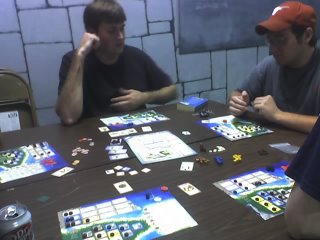Weekly gaming session
 So I finally played Andreas Seyfarth's Puerto Rico (BGG, BUY ME!).
So I finally played Andreas Seyfarth's Puerto Rico (BGG, BUY ME!).
I had already played San Juan, so I had an idea what to expect from PR in terms of theme and general play: Buildings have powers and are worth points, players choose the phase order, there's colonial goods, you sell 'em, etc etc. I'm greatly simplifying here.
We played a five-player game of Puerto Rico as an opener: Myself, Tim, Galen, Jeff, and another fellow. Everyone else but I had played already. While I played with guys I didn't know very well, more of the regular crew showed up and wound up playing their own first session of Puerto Rico at the next table over. Overall, their response was warmer than mine. I usually rate games fairly strictly according to the BGG rankings. I give Puerto Rico a 6: "Ok game, some fun or challenge at least, will play sporadically if in the right mood." I fully concede that I would change my rating after more plays. This session lasted about two hours. Scores were something like 40-50ish for players Galen, other guy, and Jeff (Galen won by the slimmest of margins a single point using the tie-breaker rules); I came in fourth at 33, and Tim came in last at 31.
Puerto Rico appears to be something of a litmus test across players; it ranks #1 on BGG, and has the potential to polarize players on the issue of slavery. Ultimately, I'm a little lukewarm on it, largely because of its hype. I know I will play it again; there's a lot going on. I really don't think I'd jump out and suggest playing this game. A good thread on BGG talks about how PR is almost a perfect information game, like chess, Diplomacy, or checkers, with virtually no luck and the largest unknown factor being the moves of other players. Like chess, there are right moves and wrong moves in Puerto Rico. I think this one is deeper than chess, but perhaps not as broad.
Definitely need to do some percolating on this one.
I next pulled out Jungle Speed (BGG, BUY ME!), as Lisa had heard about it from Steven, Marc had heard about it from others (mostly me and Story-Games), and a few people had played it last time. It's still awesome, and still available to buy. Buy it using that link so I can get a kick back and buy more games. Go on, you know you want to. Once we'd played a few rounds, folks were ready to play something different while the night was still young.
We had about eight people, and someone suggested Mao (BGG, WP), for which there was general consensus and two ordinary playing card decks were purchased. The first rule of Mao is that you do not talk about the rules of Mao. Note that the Wikipedia article there will spoil you if you choose. I'll maintain professional courtesy here in print and reiterate that Mao is a game where you are expressly forbidden to talk about, mention, or ask about the rules. The enjoyment of the game is primarily derived from deducing the game rules, observing those trying to do the same, or moderating the rules for new players. Mao is a meta-game, not a game.
More fascinating is the emerging evidence of the game's semi-oral tradition between the two players who had played Mao before, but never with each other. I got pretty frustrated and left mid-game. I'm not entirely proud of that. A contributing factor is the fact that Norman had gotten fed up, insane, or dead in their game of Arkham Horror and lured me away.
Pre-Katrina, my man Simon had recently picked up a copy of Klaus Teuber's Domaine (BGG, BUY ME!). I hadn't played in more than a year, and it turns out that Norman has a copy, which I'd been itching to play for a few weeks. The stars aligned correctly and a game commences between myself, Norman, Dan, and Kelly. I was looking forward to playing the game actually by the rules, as we had missed a few important ones in my first play.
I like this one. It's fundamentally an area control game, with players spending their money to use actions allowed by their cards. Actions include placing borders, expanding domaines, placing and converting knights, and causing treaties. Some of the appeal for me is the fun of building, but I know that I can get too caught up in that kind of amusement and not focus on winning.
Kelly didn't care for the game too much, coming in last, and Norman and Dan were neck-and-neck up until the end. I had a strong showing until the beginning of the endgame, when a clever move by Norman robbed me of some victory points. Play and teaching the game took a little over an hour.
Finally, to close the evening in the last few minutes, Norman had never played Fluxx (BGG, BUY ME!), and Steven and Lisa had just purchased a copy up at Gen Con. The seal was broken, and Marc hopped in, though Steven was planning on purchasing a game, so he stayed out.
What can I say about this? It's Fluxx. Draw one, play one and every card changes the rules: what you do, how to win, what you can do. You should play it once and see if you like it, but I'm tepid on it. It's good if you set a time limit: I've seen games that finish in less than a round and I've seen games that last an hour plus of tedium. I remember liking Fluxx back when I first played it, and I know that one can derive enjoyment from it. However, due to the inherent randomness of the game, you can eventually find yourself playing a game where the rules are not fun: Draw Five, First Play Random, Hand Limit 0, Goal: Ten Keepers. That's an extreme example, but it's possible. My ultimate assessment is that you can enjoy Fluxx until you've played one of those games, and suddenly don't want to play it ever again.





No comments:
Post a Comment